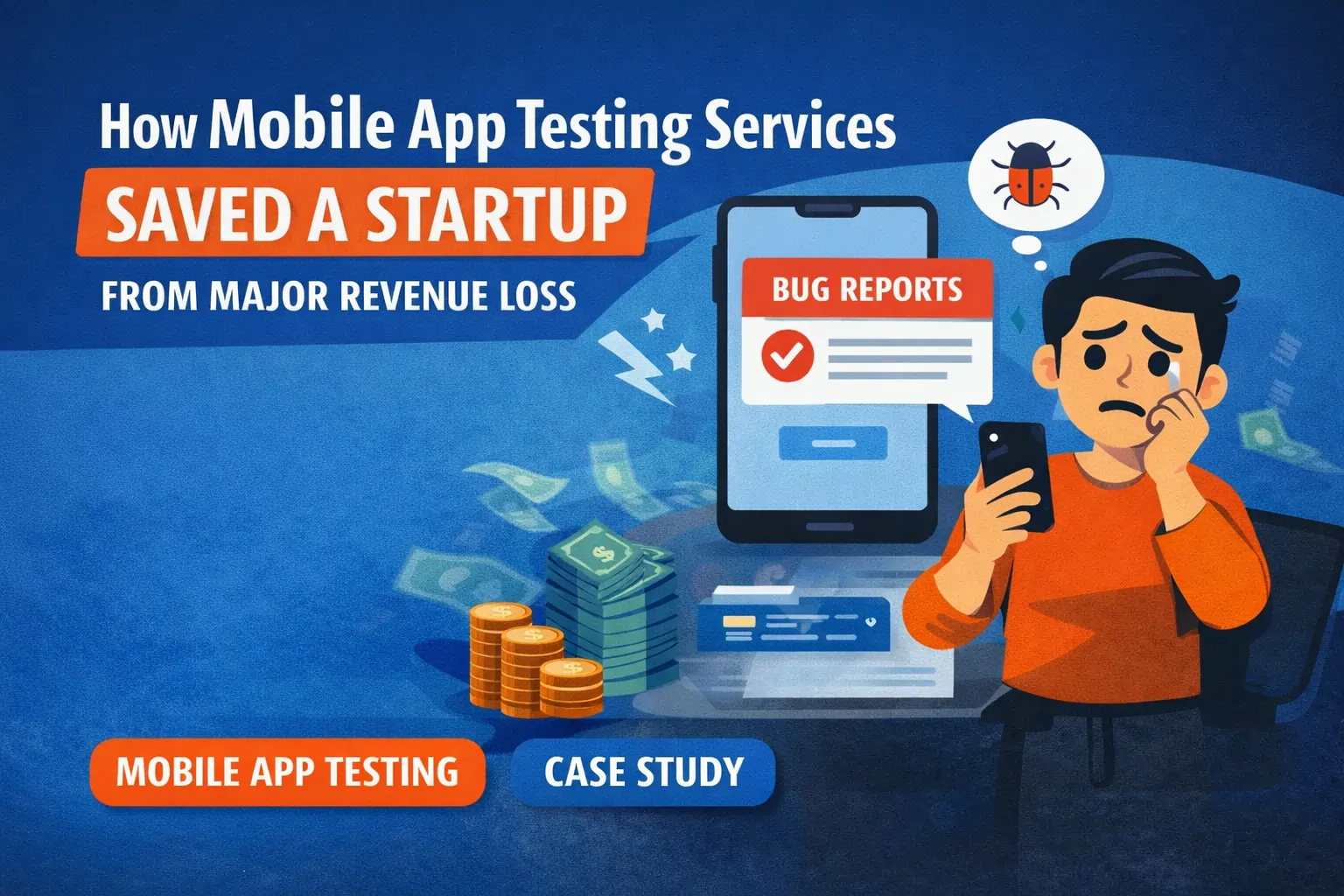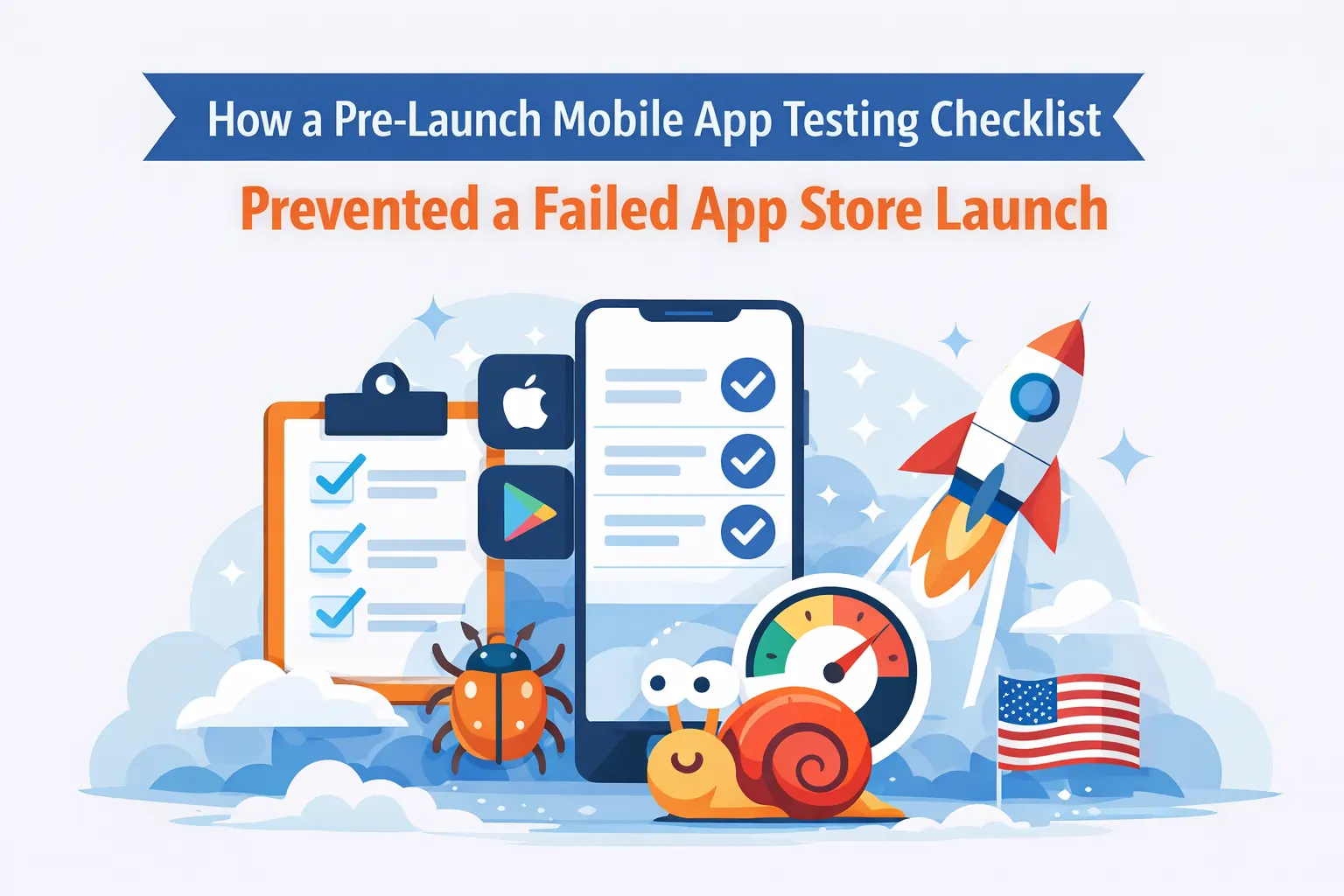Why Skipping Android App Testing Services Can Be a Costly Mistake
In today’s fast-paced mobile app market, Android app testing services play a crucial role in ensuring the success of your app. With millions of Android devices in use globally, the Android ecosystem is highly diverse, meaning your app needs to function smoothly across different devices, versions, and screen sizes. Skipping proper Android testing can result in hidden issues, security vulnerabilities, and poor performance, ultimately damaging the reputation of your app and business.
By choosing the right Android app testing company and leveraging a mix of manual and automation test Android strategies, you can ensure your app delivers the best possible user experience, driving positive ratings, higher retention, and increased user engagement. Let’s dive into why Android app testing services are indispensable for your app’s success.
1. Unseen Bugs Lead to User Frustration in Android App Testing
Hidden Bugs in Android App Testing Can Lead to Problems
When Android app testing services are overlooked, bugs that could negatively impact the user experience might go undetected during development. Issues such as app crashes, slow performance, or unresponsive features can remain hidden until the app is released to the public. Utilizing manual Android app testing is crucial to uncover these flaws before users encounter them. Failing to conduct this essential testing could result in an app that does not meet expectations, frustrating users and leading to negative reviews and higher uninstall rates.
How Poor Performance Affects User Retention
Maintaining strong user retention is crucial for the long-term success of your app. If your app experiences crashes or poor performance, users will quickly abandon it. Negative feedback and low ratings on platforms like the Google Play Store will further damage your app’s reputation. To avoid these issues, make sure your app undergoes comprehensive real device testing Android and Android app automation testing to identify potential issues before they affect your users.
Get our mobile app testing services
2. Poor User Ratings and Reviews Due to Lack of Android Application Automation
The Importance of Automation Testing
Android application testing solutions help catch bugs that might otherwise go unnoticed in manual tests. Automated scripts simulate user actions on different devices, making sure the app functions consistently across platforms. Without automated testing, your app may face performance issues, leading to poor user ratings and negative reviews.
Impact on App Store Reputation
Apps with poor performance often receive low ratings, which harms the app’s visibility and reputation. If your app doesn’t function correctly, users will be quick to leave negative feedback. Using Android app test automation services tools like Appium ensures that bugs are caught early, enhancing the overall quality of your app and improving its chances of receiving positive reviews.
3. Increased Development Costs from Lack of Android App Automation Testing
Post-Launch Fixes Are Costly
Fixing bugs after an app is launched can be expensive and time-consuming. When you skip Android app test automation services, issues such as crashes, slow loading times, and broken functionality can go unnoticed until users complain. These issues must then be addressed in updates, which require additional developer time and resources, slowing down future feature releases.
Efficiency Through Automation Testing
With Android app test automation services, developers can detect and fix issues early in the development cycle. Automated tests run faster than manual tests, identifying bugs quickly and allowing developers to focus on adding new features instead of fixing post-launch problems. This approach ultimately saves time and reduces overall development costs.
4. Brand Reputation Damage from Ignoring Android application testing solutions
Protecting Your Brand’s Image
Skipping Android app testing services can damage your brand’s reputation. If your app is buggy, crashes frequently, or has major performance issues, users will quickly associate those problems with your brand. In today’s competitive app market, reputation is everything. Even a single bad review can affect your app’s ranking and reduce future downloads.
The Importance of Thorough Testing
An Android app testing company can perform a thorough assessment of your app, ensuring it’s free of bugs, works across various devices, and meets user expectations. Investing in both manual and automation testing ensures your app works flawlessly, preserving your brand’s reputation and building trust with users.
5. Missed Market Opportunities Due to Lack of Android App Beta Testing
The Importance of Beta Testing
App user acceptance testing (UAT) allows you to gather real-world feedback from users before the official launch. Beta testers can identify usability issues and bugs that you might miss in the development phase. Without this step, you risk releasing an app that hasn’t been properly optimized, which can negatively affect its performance in the market.
Competitive Disadvantage
By skipping Android app beta testing, you miss the chance to refine your app based on real-user input. Competitors who incorporate beta testing into their process may release better-polished apps, gaining a competitive edge.
6. Compliance Risks When Skipping Android App Manual Testing
Regulatory Compliance
Certain industries, such as healthcare, finance, and education, require apps to comply with specific regulatory standards. Android app manual testing ensures your app meets compliance requirements, such as data privacy regulations (e.g., GDPR, HIPAA) and security protocols. Manual testers can assess the app’s functionality in ways automated tests cannot, making them essential for ensuring regulatory compliance.
Avoiding Legal Risks
Without Android app manual testing, you risk overlooking compliance issues, which could lead to legal consequences. Whether it’s ensuring that personal data is properly encrypted or verifying that users can access specific security features, manual testing is vital for safeguarding your app against potential legal liabilities.
7. Performance and Compatibility Issues in Android Testing Across Devices
Optimizing Your App for a Diverse Range of Devices
The Android ecosystem comprises a wide variety of devices, each with unique specifications, screen sizes, and Android OS versions. If your app isn’t tested to perform well across these diverse devices, you risk losing a significant portion of your user base. Conducting real device testing on Android is essential to ensure that your app functions seamlessly on the different devices your users may own.
Ensuring Consistent Functionality Across All Devices
When you test an Android app on actual devices, you can detect issues that might be invisible in emulators or simulators. For example, an app that works smoothly on one model might fail or perform poorly on another. By testing your app on a wide range of real devices, you guarantee that your app offers a consistent and reliable user experience for everyone, no matter which device they use.
8. Inconsistent User Experience Across Platforms Without Automation Testing for Android Apps
Automation Ensures Consistency
Without Android app test automation services, some features may function properly on certain devices but fail on others. Automation test Android tools help ensure that key features perform consistently across a range of devices, screen sizes, and OS versions, preventing user frustration due to inconsistent experiences.
Ensuring a Seamless Experience
By using automation tools, you can quickly test your app on multiple devices simultaneously, ensuring that the user interface, navigation, and performance are uniform across all platforms. This consistency is key to providing users with a seamless experience.
9. Security Vulnerabilities Missed in Android App Automation Testing
Automated Security Checks
Security vulnerabilities in your app can have severe consequences, including data breaches and privacy violations. Automated testing can run frequent security checks to detect vulnerabilities such as unauthorized access or weak encryption. Android app test automation services ensure that your app is secure from malicious attacks and protect sensitive user data.
Identifying Security Gaps Early
By performing Android app test automation services, security vulnerabilities are identified early in the development process, reducing the risk of data breaches post-launch. This proactive approach helps ensure that your app meets industry security standards and user expectations.
10. Increased User Churn with Faulty Android Testing
Impact on User Retention
If users encounter crashes or performance issues with your app, they are unlikely to return. Android app manual testing and automation testing for Android apps can identify and resolve these issues, ensuring that the app runs smoothly and retains users. Fixing issues before launch will help improve retention rates and prevent uninstalls.
11. Inefficient Resource Allocation When Skipping Android App Testing Services
Shifting Focus from Bug Fixes to Development
By neglecting to implement Android app testing services, your development team may end up spending excessive time resolving problems that could have been caught earlier. This diversion of resources away from creating new features can slow down your app’s development process and hinder its long-term growth.
Boosting Developer Efficiency
Investing in thorough testing, both manual and automated, ensures that developers can concentrate on innovating and enhancing your app, rather than constantly fixing bugs that should have been detected in earlier stages. This approach helps streamline the development cycle and enhances the overall productivity of your team.
12. Lower Return on Investment (ROI) from Skipping Appium App Testing
The Power of Appium in Automation
Appium app testing is an automated tool that works across different platforms, helping you detect issues early in the development process. By skipping Appium testing, you miss out on the opportunity to perform cross-platform tests efficiently, ultimately lowering your app’s ROI. Automated testing tools like Appium ensure quicker testing and better quality, resulting in faster releases and fewer post-launch issues.
Maximizing ROI
By catching bugs early and improving app quality, Appium helps boost your app’s ROI, allowing you to focus on user acquisition and growth rather than spending valuable time fixing issues.
13. Challenges in Scaling Your App Without Proper Android Testing
Ensuring Scalability in Your App
As the number of users increases, your app must be able to manage higher volumes of traffic and data. Without thorough Android application testing solutions, you may encounter performance problems like slow loading times or crashes as more users engage with your app. Conducting proper testing ensures that your app is capable of scaling smoothly, and maintaining strong performance even as your user base grows.
14. Decreased Customer Trust from Poor Android App Beta Testing
Building Trust Through Beta Testing
App user acceptance testing (UAT) provides real user feedback before the app’s full release, helping you identify and resolve issues that could damage user trust. By skipping beta testing, you miss an opportunity to polish your app and improve its performance based on real-world usage.
15. Delayed Time to Market Due to Lack of Comprehensive Testing
Faster Releases with Testing
Skipping through Android app testing services can delay your app’s time to market. Issues found post-launch are typically more difficult and time-consuming to fix. By investing in both manual and automated testing, you can speed up the development cycle and release your app on time.
Conclusion
Skipping Android application testing solutions can be a costly mistake for developers and businesses. From performance issues and security vulnerabilities to missed market opportunities, the consequences of inadequate testing are far-reaching. Whether you opt for Android app manual testing, Android app test automation services, or real device testing Android, thorough testing ensures that your app delivers a smooth, reliable, and secure experience for users. By investing in the best Android application testing solutions, you can minimize risks, improve user retention, and achieve greater success in the competitive Android app market.











